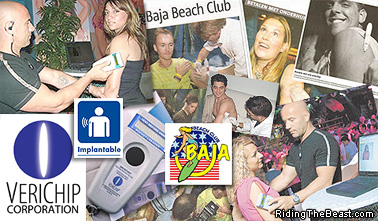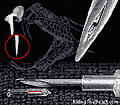
RFID implants, NFC payment and the Mark of the Beast
Look around, the Mark of the Beast is everywhere. It appears in the media frequently and is being watched in the nasdaq. Not only is it under the watchful eye of the discerning Christian [1], but it's also being scoped by the privacy advocate [2][3] and businessman alike [4]. It's even become a fashion statement* [5].
How can I boast such claims? Simple. RFID (Radio frequency identification) and near field communications (NFC) payments are currently the prime candidates for this beastly technology. These tiny wonders have already been implanted in the body to be used as a form of payment [6].
* Beautiful club-goers had a problem: If you're going to wear a halter top and micro-skirt, there's not much of anywhere to put a wallet. Who wants to carry a purse when you're there to dance? In 2004 a company called VeriChip unveiled a solution based on radio-frequency identification (RFID) technology. A slender glass capsule ... a computer chip, which stores a unique code that can identify an individual — like an electronic Social Security number."Get chipped, then charge without plastic -- you are the card

Verichips are implanted in the upper arm of patrons at the Baja Beach Club in Barcelona, Spain. Along with the Baja Beach Club is The Rotterdam Beach Club in the Netherlands, and the Bar Soba in Glasgow, Scotland, all who have successfully introduced the Verichip microchip implant as a form of payment.
Even with the growing evidence in support of a microchip implant, many Christians still choose to ignore the clear warnings around us. The Mark of the Beast is approaching.
More about RFID implants and the Verichip
in this series:
There's just too much evidence to discard the possibility that the Mark of the Beast will be a subdermal microchip implant. In fact, the language in Revelation strongly supports such an idea. We'll explore Revelation in the next few sections, but first let's take a closer look at the Verichip, which was the first implantable microchip used for payment.
RFID, which stands for Radio Frequency IDentification, is currently making leaps and bounds as a replacement for the common barcode. RFID is also being hyped as the next big thing in personal identification. If fact, most passports and many ID cards throughout the world carry an RFID chip.
There are two types of RFID microchips (a.k.a. tags or transponders) in development, passive and active. The barcode replacement and early versions of RFID implants were passive transponders. A passive transponder requires an outside source of energy to activate. A burst of energy within a close distance (usually a few inches) charges the microchip enough to respond with whatever information is stored on it. In the case of the Verichip, that information was a 16 digit identification number which was cross referenced against a database for unlimited amounts of information.
NFC, near field communications, is a refinement and subset of passive RFID. It's the technology that powers Apple Pay, Android Pay, Goole Pay, and the like.
In contrast, active RFID tags have their own power supply and require no outside energy to broadcast their information. If this type of microchip is to be implanted in the body, an internal, renewable power supply is a must. This is a major challenge and is also big business.
Commercial devices are coming to market which will be surgically implanted and require some sort of power supply. This is nothing new, consider the pacemaker. The big difference though is that a pacemaker runs on batteries, and batteries need to be replaced. Replacement requires another costly operation, which inherently involves risk. The point of an internal, renewable power supply is that the batteries will never have to be replaced.
There is already existing technology that provides a means of creating an electrical current through the process of temperature change. The Mark of the Beast is said to be in the hand or forehead and it's no surprise that these are prime areas for hot and cold changes.
 ThermoLife is a technology that converts temperature change into electricity. It is touted as "a viable energy source for low-powered devices such as chipsets, wearable electronics, implantable medical devices, active RFID tags and numerous other applications". Thermo Life [7][8] was acquired by Applied Digital Solutions through it's purchase of eXI Wireless and is now owned by Thermogen Technologies, Inc. Consider the following:
ThermoLife is a technology that converts temperature change into electricity. It is touted as "a viable energy source for low-powered devices such as chipsets, wearable electronics, implantable medical devices, active RFID tags and numerous other applications". Thermo Life [7][8] was acquired by Applied Digital Solutions through it's purchase of eXI Wireless and is now owned by Thermogen Technologies, Inc. Consider the following:
"This next-generation Thermo Life™ is a direct result of VeriChip Corp's acquisition of eXI Wireless. Knowing that the acquisition was in the process, our research and development personnel aimed to improve the Thermo Life™ product to provide a potential power source for an active RFID tag for People." Scott R. Silverman, Chairman and CEO of Applied Digital
Thermo Life is a permanent power supply that operates off temperature fluctuations in the human body. One of the main advantages of a powered (active) RFID implant is to allow for location tracking similar to GPS. In fact, Applied Digital Solutions was hard at work incorporating GPS into RFID implants for the allowance of global tracking [9]. Thermo Life could power such devices. The name alone is reminiscent of eternal hell fire, exactly what partakers of the Mark of the Beast can look forward to.
Why Verichip Corp?
Why Applied Digital Solutions, why Verichip Corp, why not some other company or device? Because Applied Digital Solutions held the patent to "A transceiver device implantable in a human body comprising: a triggerable radio frequency transmitter, a power source for powering said transmitter, triggering means for activating said transmitter, receiver means allowing the detection of an externally generated information signal,..." [10]
That covers the complete operation of the RFID microchip and the device to read its signal. No company could legally step in and manufacture a similar device. The patent is absolutely correct when it states that "The device meets the growing demand for a new level of safety and peace of mind."
Verichip was successful in marketing and developing external RFID devices that track people at small and large scales. Their Hugs and HALO products still track newborns while in the hospital. RoamAlert and WatchMate are external devices used for security or "Wander Prevention". These technologies are now owned by Stanley Healthcare.
 Verichip Corp's implantable products included VeriMed, VeriGuard, [11] VeriKid, and VeriPay. RoamAlert also came in an implantable version. Verichip Corp, now known as Veriteq, had pulled all references to their VeriPay product, presumably due to its association with the Mark of the Beast.
Verichip Corp's implantable products included VeriMed, VeriGuard, [11] VeriKid, and VeriPay. RoamAlert also came in an implantable version. Verichip Corp, now known as Veriteq, had pulled all references to their VeriPay product, presumably due to its association with the Mark of the Beast.
The same technology used in these products, namely the Vericihip, was purchased from Veriteq by JAMM Technologies in 2016 and is now marketed for medical identification in breast implants. Other medical devices could follow.
Why not Verichip Corp?
Verichip Corp ran into troubles after its introduction of a microchip payment system. There was a lot of pushback from the public and discerning Christians. Its ultimate death blow was the identification of tumors surrounding similar microchips in pets [12]. These health concerns can be addressed with enough money, development, independent studies, and case studies of existing implants in willing volunteers. In the meantime we have our watches and phones. They satisfy the technnological requirements of the Mark of the Beast in regards to payment, being both "in" and "on" the hand.
The various technologies have been bought and sold several times, with the latest iteration of the Verichip landing directly into breast implants, "devices" which must be registered in the Medical Device Registry, introduced under president Obama. The patent portfolio of Verichip Corp has expired but the technology is still marching forward.
The Progression of Microchip Implants
The first people to receive RFID implants in large numbers could be those who need a watchful eye; children, the elderly, immigrants, prisoners and paroled criminals are all likely candidates. The list goes on.
Police officers and gun owners could also be some of the first to accept an implant. A microchip in the hand and another in the gun restricts operation of the weapon, thereby reducing accidental death and increasing safety [13][14]. Imagine a law requiring citizens to get a chip in their hand in order to own or discharge a firearm. Allegience to the Beast? It's not a far fetched scenarion. A watch is too dangerous for such an application due to the larger distance required compared to a hand on a pistol grip. Several inches would make a big difference when wrestling away a gun.
RFID implants and NFC are marketed in a diverse range of applications. Notably payments. Phone and watch payments are nearly ubiquitous via Apple Pay, Android Pay, and Google Pay. Active RFID has given way to NFC and GPS. Microchip implants are close but still need work. Security is mostly solved for external payments, but it's still the biggest hurdle for implantable adoption since early generations of RFID implants were proven insecure [15][16]. There's no room for error when finances and identification are at stake.
Large scale applications have already been successful in animal "chipping", both in pets and livestock. These are perfect pilot programs to test and refine a system that could be used on the populace. Criminals could follow since they have no choice in the matter. Elderly dimentia patients are prone to wandering and severe lapses of memory. Border control is currently a touchy subject. Watches for tracking the health and location of children could become more common as the fears of parents are increasingly preyed upon. Schools have already introduced RFID identification. A restless and rebellious group of people will be getting "chipped" because they think it's cool [17].
Let's take a deeper look into the Biblical language surrounding the Mark of the Beast.

Links referenced in this study:
[1] GETTING CHIPPED: How the mark may be applied in these last days
[2] spychips.com - how RFID will compromise privacy, security, freedom
[3] RFID Position Statement of Consumer Privacy and Civil Liberties Organizations
[4] RFIDs: Great New Logistics Business
[5] USA Today Reports on Nightclub VeriChip
[6] Paying for drinks with wave of the hand
[7] Applied Digital Solutions Achieves Thermo Life Breakthrough
[9] Deal forged to equip VeriChip with GPS
[10] United States Patent 5629678 - Personal tracking and recovery system
[11] VeriMed, VeriGuard and VeriTrace systems from a single supplier
[12] Medical microchip for people may cause cancer
[13] Implanted microchip would allow only police officers to fire their guns
[14] VeriChip and Guns
[15] Verichip RFID Implant Hacked!
[16] Demo: Cloning a Verichip Yourself
[17] Implanted RFID Chips in Humans being Taken to Whole New Levels









6 Comments for RFID implants, NFC payment and the Mark of the Beast
~~~
by Michael - 5/16/23 6:46 PMNo Replies Post a Reply
brief re: keyword steak
by Joseph A. Sprute (616) - 9/20/22 4:49 PM1 Reply: Post a Reply
RE:brief re: keyword steak
by John - 1/15/23 9:57 PMcopyright
by Andrew ????? - 5/30/22 9:20 AMNo Replies Post a Reply
Tap card (on the forehead) on the bus
by Mark Bouman - 11/05/19 4:39 PMNo Replies Post a Reply
Secure Salvation vs. Unsecure
by Troy - 10/26/18 12:44 PMNo Replies Post a Reply
Comment on RFID implants, NFC payment and the Mark of the Beast